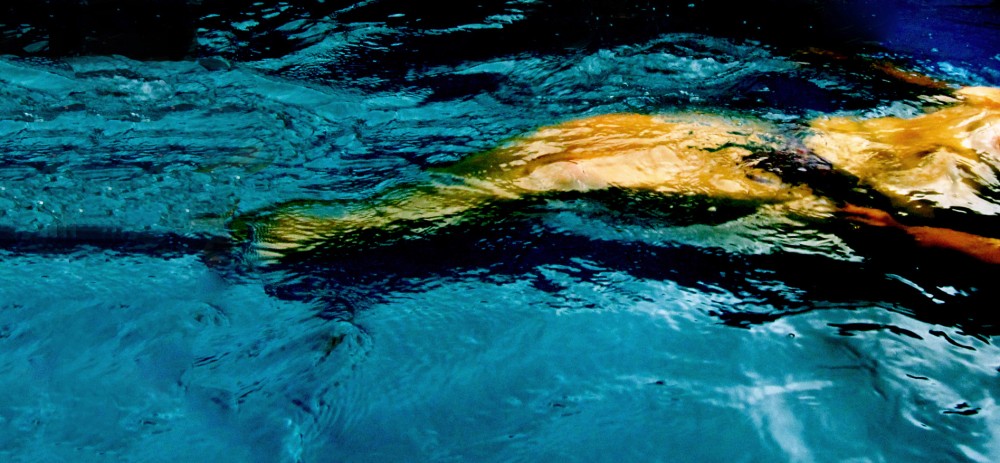I am fishing with Roland on the breakwater off Dawlish beach (this is a few days ago, prior to the onset of our terrible colds); from where we are standing you can see our lofty Victorian terrace built into the cliff and, in particular, you can see the sky-blue parasol peeping above the white balustrade on our balcony. The new rods my mum bought us at the bargain price of fifteen pounds each from our Trago Mills store are a great success, not that we have caught anything yet, but the rods feel good and flexible, and the reels actually work rather well (we had worried they might be children’s rods, or inferior in some way at that price). Roland baited up the hooks with squid and cast out both lines (he is more proficient than me) and now we are waiting for bites. A man wearing a baseball cap is walking towards us. I suspect that the man wants to walk by us to reach the end of the breakwater and I take a half-step closer to the side to let him pass. The gentleman doesn’t deviate and so, when he almost reaches my spot, I look directly into his eyes and smile.
“Hello!” I say.
Now this gentleman’s face lights up. Anyone would be forgiven for thinking that he is unused to strangers greeting him.
“Hello,” he returns with a smile and continues speaking in a broad, but not unpleasant, Exeter accent, “what a glorious day to be fishing at Dawlish! I live in Exeter, as you might recognise from my accent. Do you know, I must be about the only person left with an accent like this? Even my children, who are doctors and lawyers, can’t understand why I still have an accent in these modern times, but I’m a man from the country and not ashamed of it. You youngsters probably can’t remember the times when nearly everybody had accents.”
Unused to being called “youngsters”, Roland and I look at each other quizzically for a split second and I know that my good friend is thinking the same as me – “How old can this man be?”
“Roland lives in Australia and he still sounds like a Londoner to me,” I say.
“But I’m from Hampshire, not London,” Roland exhorts.
“Yes, but you sound like a Cockney to me,” I say.
“That’s because you were born in Australia,” retorts Roland and we all laugh.
For the next thirty to forty minutes we three discuss Australia, fishing, holidays, Dawlish, children, accents and more… At last Trevor (for by now we have introduced ourselves) holds out his hand to mark his departure.
“It’s been wonderful to talk to you both,” says Trevor shaking our hands very meaningfully, “A lot of youngsters don’t talk nowadays.”
“How old are you – if you don’t mind me asking?” I ask.
“Seventy-seven,” he replies.
I search Roland’s face and see that he agrees with me that Trevor doesn’t look that age.
“I hope we’ll meet again some day,” I say.
“Well,” the nice man pauses, “I’m not so sure about that, you see I have cancer – it started with the prostate and now it’s in my liver and bones – and I take each day as it comes. I try not to think about the cancer. And I’m still here, a year longer than what the doctors said.”
The tears are in my eyes and I’m suddenly desperate to help Trevor.
“I know you’ll think I’m nuts but will you let me give you my healing hands?” I ask. (Some people say I have the gift of healing and curing warts.)
So while I’m putting my hands over Trevor’s back he tells us:
“This morning it was such a beautiful day that I just felt like going to Dawlish and being by the sea. My wife said, ‘Don’t go out – you’ll be better off inside.’ But I told her that I have to enjoy each day that I have. I’m so glad that I came over to Dawlish.”
I can see Roland’s eyes glistening too. Trevor shakes our hands again and, smiling and waving occasionally, he walks back to the seawall.
“I’m so glad we didn’t hurry him away,” I say.
“Yes,” agrees Roland, “after all, what is forty minutes to us?”
And a little later Roland caught his huge toadfish.
Like this:
Like Loading...












































